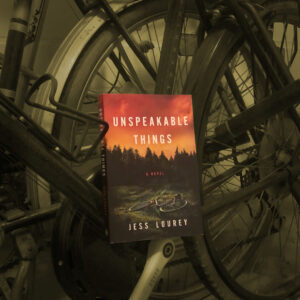
Publication Date: January 1st, 2007
Publisher: Charco Press
ISBN: 9781999368432
Genre: Fiction
Strong Point: The way the author tells the story is very clever. The mixture of flashbacks and the present time makes the reader understand why the characters behave in the way they do.
Weak Point: Any!
Books on Tour Rating: 



 (5/5)
(5/5)
Goodreads Rating: ⭐️⭐️⭐️⭐️ (4.09/5)
“What could’ve been so terrible that she preferred to walk through the thunder and lightning she believed could kill her?”
“ELENA KNOWS”
Elena knows everything. About everyone. Or so she thinks. She also knows herself quite well.
But she knows the most about her daughter Rita, about her life, what she thinks, what she feels. She knows Rita’s very deepest secrets and thoughts. Doesn’t every mother think so? Or maybe not? Let me explain…
THE STORY
Our main character, Elena has Parkinson. The illness is already quite advanced and she needs help for a lot of tasks in her everyday life.
The tempo and the structure of the novel are marked by the pills Elena takes during the day in order to move and perform small tasks.
Her daughter Rita has died and everyone thinks she has committed suicide. But Elena knows better. She could have not commit suicide because she knew Rita extremely well. Rita has been killed.
The story begins when Elena takes one of those pills. After waiting for that pill to kick in, Elena is able to walk to a taxi. She wants to visit Isabel and ask her to help her find the person who has killed Rita.
The book is a succession of flashbacks narrated by Elena about the people who knew Rita, told around the ingestion of the pills which make Elena “function”.
However, we will find out through the story that Elena does not know anything at all about Rita or the people around her.
TELLING THE STORY THROUGH THE FLASHBACKS
The use of flashbacks is nothing new in narrating a story. However, the way Piñeiro uses them is incredibly well done.
With these flashbacks, we learn about Roberto Almada, Rita’s boyfriend. Elena despises him deeply in a way only a mother can despise a son’s in law. It is just a vain attempt to lure her daughter closer to her so that Elena is not feeling so lonely.
In addition to this, we also learn about Elena’s first moments with her illness and how she has been coping with it. Also we know how Rita copes with her mother’s illness, but of course, mostly only from Elena’s perspective.
And finally we know about Isabel. But her story you have to find out for yourself.
THE ILLNESS
Elena’s body speaks to her through the illness (page 41). Elena thinks that Parkinson, another character in the book, is punishing her for having done something wrong, but she doesn’t know what it is that she did wrong. Elena will know at the end of the book…
The way Elena behaves towards her illness is both fascinating and weird at the same time. It was very hard to read about Parkinson through Elena’s words. The way she describes her body, and how it doesn’t belong to her anymore but to the illness is heart breaking.
As the narration unfolds, we realize Elena’s cold behaviour and her brusqueness with everyone is just a coping mechanism against her illness and how society treats her because of it.
Preparing for this review, I read an interview with Piñeiro where she explains that her mother died from Parkinson so unfortunately she knows the illness intimately. The book is, in a way, a homage to her mother. She is putting Elena at the center of the story as well as she is putting her own mother too.
FINAL THOUGHTS ABOUT “ELENA KNOWS”
I bought “Elena knows” as a recommendation from Jen Campbell. I have been watching her youtube videos for years and she has “made” me read lots of fascinating books, for what I deeply thank her.
For Jen, this book was one of her favourites when she read it so I knew I had to read it. And the book has become one of my favourites too.
The story, the narration, the cleverness of the author, the style, the vocabulary, everything stands out.
It touches very diverse topics like the hypocrisy in Catholicism and the (mis)use of women’s bodies by other women as well as by society in general.
I cannot recommend enough its reading. Such an incredible book is a superb reading experience. Just please be aware of the trigger warnings.



